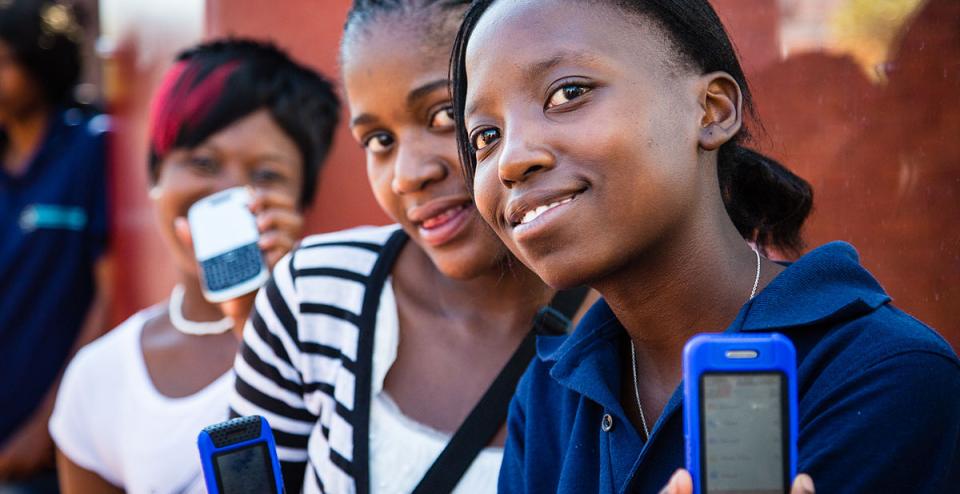
Photograph by Omaranabulsi under CC BY-SA 3.0 license
The African market is flooded with zero rating services such as Free Basics (Facebook’s zero rating scheme) and other subsidised data strategies. Do these schemes make internet more affordable and bring access to more people in Africa? The main plus for Free Basics has been that it provides free watered down internet access to those who don't usually have that kind of access, even to selected sites and to social media. In this column I will examine if this is seen as a major data saving strategy in Nigeria, Kenya, Rwanda and Nigeria - places where ResearchICT Africa has conducted their focus groups studies.
Subsidised data was taken to mean access to free or cheaper data either from zero-rated services or promotions from operators
Navigating data costs for some begins from choosing whether to spend money on data or on basic necessities. For both male and female respondents in South Africa and Kenya -- they would rather use their money on basic necessities. For one South African respondent in the deep rural area, data was a necessity but they had to sacrifice it. A rural Kenyan respondent cited that the money he earned was not enough to buy data:
You see what you work for is only enough to eat for the day and you wake up the next day to start all over again. So you don't get extra for surfing. It would be nice if people get that free Internet because people would be able to Google.
These sentiments were echoed by female rural South African participants who stated that they could not afford to part with the little money they had.
Cost saving strategies
In predominantly mobile and pre-paid market, Research ICT Africa, has been tracking the price of 1GB data basket for all operators in 49 African countries as part of the RIA African Mobile Pricing Index [1]. The 1GB basket comprises the monthly cost of 1GB data, based on prepaid data top-ups or bundled top-ups.

1GB is assumed to be sufficient for an average internet user per month and a global benchmark. Egypt currently has the cheapest monthly 1GB price at USD1,49. Looking at the countries that were part of this study, South Africa has the most expensive 1GB price at USD7,49. However, for respondents in our focus group study, this was not the most popular option for mobile data.
Network is one great challenge, then the cost. You want to download a book, before it is complete you hear a message ‘tititit’ you are running short of bundles, the bundles are almost depleted. - Peri-urban female respondent.
Respondents had different strategies in navigating costs that were greatly determined on how much they could spare for data as illustrated in table 1.
|
Mobile data-saving strategies across four countries by location |
|||
|
Urban |
Peri-urban |
Rural |
|
|
Nigeria |
- Prepaid package data - Reward data - Service specific bundles |
- Zero rating, - Prepaid package data, - Reward or promotional data, - Tethering |
- BlackBerry plans - Reward data |
|
Kenya |
- Prepaid package data - Promotional mobile data - Modem data - Tethering |
- Promotional data - BlackBerry data, - Zero rating |
- Prepaid package data - Rewards data |
|
South Africa |
- Prepaid package data - Service specific bundles - Rewards data |
- Rewards data through operator promotions - Mobile tethering hotspots - Mobile airtime - Zero rating - Service specific data - Prepaid package data |
- Prepaid package - Rewards data through operator promotions |
|
Rwanda |
- Rewards data through operator promotions - Modems - Prepaid package data |
- Rewards data through operator promotions - Prepaid package data |
- Rewards data through operator promotions - Prepaid package data |
Source: Author’s own from Research ICT Africa (RAMP) Index 2016 www.researchICTafrica.net
Shorter prepaid package data (for example, lasting one week, a day or even less) were preferred over the longer term (monthly or yearly for example) by men and women because the former costs less. A rural male participant from Kenya indicated that he can only afford to spend Ksh.20 (USD 0,20) per day on Internet, which he divides between Facebook and WhatsApp. A student in peri-urban Nigeria put it as:
Sometimes I normally subscribe N1000 Etisalat but in the process before the month ends they will tell me that my data has been exhausted without using it. Do you understand? I decided not to use that N1000 because it will be a waste for me. I am now using one week or three days…
Over a long period, it is more valuable to purchase larger long term bundles in terms of volume and price over time. Peri-urban and urban Internet users demonstrated awareness of different data saving strategies by taking advantage of rewards data (data that one receives after purchasing a service from the operator). Rewards data is available in different forms, for example, as a reward for recharging one’s phone with airtime, as is the case on specific networks in Nigeria, Kenya and South Africa.
Airtel does give extra bundle. In fact, I was not concentrating on it until a particular time when I said “what is this message that comes to my phone every time?" So I tried to access it. At the end of the day, lo and behold from that day I was able to say what I had as point was about N6000 (USD 19), enough for me to have my one-month data plan that I probably pay 2000 naira (USD6.4) for’. (Male respondent, urban Nigeria)
However, these bundle reported by respondents often come with a shorter time value limiting the extent to which they may be used. Social media popularity is harnessed by operators to push products designed to entice avid social media users. Social- media- only data packs were popular amongst all respondents, as part of their data management strategies. In particular on can purchase WhatsApp, Facebook or twitter only bundles. This is more pronounced in urban and peri-urban areas, as network coverage of operators offering this services sometimes does not extend to rural areas in Kenya, Rwanda and South Africa.

Illustration by Thandiwe Tshabalala for RIA
Zero rated Freebasics by internet.org was offered by operators in all countries. Criticism around Freebasics was its violation of net neutrality and creation of a walled garden for new internet users that it sought to bring on board. However, in a market study done in these countries, with the exception of Rwanda, freebasics forms part of multiple offerings offered by operators to draw in new and price sensitive data users.

Image: South African operator Cell C Whatsapp bundle.
Freebasics, if and when used, is part of multiple strategies to combat data costs by long time internet users. Bearing different contexts in mind, for various reasons zero rating is not as popular amongst new and old Internet users. Some respondents, in particular in rural areas claimed to have not heard of the service, even though they use the service provider who offers the service. A respondent in rural Nigeria cited a lack of advertising, which meant people were not aware of it. An all-female, peri-urban focus group in South Africa claimed not having heard about it.
For others, zero rated freebasics limited their internet experience. In Nigeria, one male respondent stated he has used it but ‘couldn’t go deep with it’ and another stated that ‘people that don’t want to take Internet; they’ll be okay by that because they will not pay money.’ With the exception of Rwanda, all other countries had respondents voiced general mistrust of free services: ‘I think I have heard about it, it’s an app but I have never trusted it because I do not believe in free things’ (Male Urban respondent, Kenya). New users were not motivated to go online because of the free service:
I think those free things to be honest do not motivate us to use the Internet to buy data. Personally speaking those things do not motivate me. Those free data and what you call it, the Internet shark swallows it very quickly.’ (Urban male respondent, South Africa)
Conclusion
Overall, navigating costs is challenge for both men and women, with data saving strategies more pronounced in urban than rural areas. Beyond the scope of this study, one may ask what are the levels of awareness on saving strategies for rural men and women. Income together with education inequalities have been cited as the the major factors for the uneven use of the Internet between men and women and this is compounded by the urban-rural divide. These prices often impact negatively on women who are likely to have lower income in comparison to men. While we have shown strategies of navigating cost, one way to measure affordability would be to look at average income and spend on data. The current round of Research ICT Africa household survey will look at the average spend of income on data grouped by income levels. This will be further broken down into by gender and location.
*If interested in updated on Research ICT Africa work and updates or access to our free household data, please sign up for our mailing list here .
Income together with education inequalities have been cited as the the major factors for the uneven use of the Internet between men and women and this is compounded by the urban-rural divide. These prices often impact negatively on women who are likely to have lower income in comparison to men.
- 6762 views






Add new comment